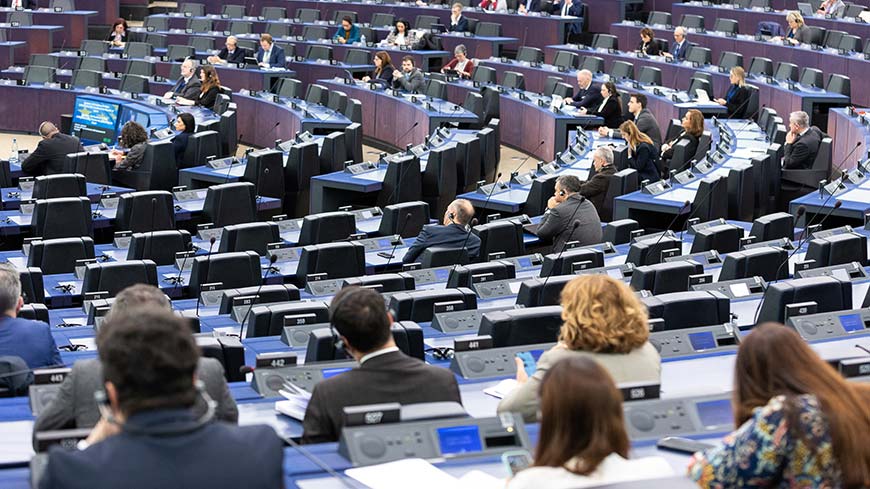in Russian – https://aga-tribunal.info/pace-25-1-2024/
On January 25,2024 the Parliamentary Assembly of the Council of Europe has resolved not to ratify the credentials of the Azerbaijani delegation. The resolution was based on a report by Mogens Jensen (Denmark, SOC) and was adopted today with 76 votes in favour, 10 against and 4 abstentions.
Excerpt from the Resolution 2527
January 25, 2023
Source: https://pace.coe.int/en/files/33333/html
Paragraph 4
Regarding the situation in Nagorno-Karabakh, the Assembly established the absence of a free and safe access through the Lachin Corridor in its Resolution 2508 (2023) “Ensuring free and safe access through the Lachin corridor” and was struck by the fact that Azerbaijan’s leadership did not acknowledge the very serious humanitarian and human rights consequences stemming from that situation, which lasted for nearly ten months. Moreover, in its Resolution 2517 (2023) and Recommendation 2260 (2023) “The humanitarian situation in Nagorno-Karabakh”, the Assembly condemned the Azerbaijani army’s military operation of September 2023, which led to the flight of the entire Armenian population of Nagorno-Karabakh to Armenia and to allegations of “ethnic cleansing”. The Assembly recalls that in Resolution 2517 (2023) it did not exclude challenging the credentials of the Azerbaijani delegation at its first part-session of 2024.
Excerpts from the Report “Challenge, on substantive grounds, of the still unratified credentials of the parliamentary delegation of Azerbaijan“
Report by Mr Mogens JENSEN, Denmark
January 24, 2023
Source: https://pace.coe.int/en/files/33302/html
Paragraph A 4
Regarding the situation in Nagorno-Karabakh, the Assembly established the absence of a free and safe access through the Lachin Corridor in its Resolution 2508 (2023) “Ensuring free and safe access through the Lachin corridor” and was struck by the fact that Azerbaijan’s leadership did not acknowledge the very serious humanitarian and human rights consequences stemming from that situation, which lasted for nearly ten months. Moreover, in its Resolution 2517 (2023) and Recommendation 2260 (2023) “The humanitarian situation in Nagorno-Karabakh”, the Assembly condemned the Azerbaijani army’s military operation of September 2023, which led to the flight of the entire Armenian population of Nagorno-Karabakh to Armenia and to allegations of “ethnic cleansing”. The Assembly recalls that in Resolution 2517 (2023) it did not exclude challenging the credentials of the Azerbaijani delegation at its first part-session of 2024.
Paragraph B 2
The substantive grounds on which the credentials were challenged refer to the deteriorating situation with regard to pluralist democracy, respect for the rule of law, human rights and fundamental freedoms as well as to the role of the Azerbaijani authorities in the events of September 2023 which led to the flight of the entire ethnic Armenian population from Nagorno-Karabakh to Armenia. All these issues cast serious doubt as to the compliance of the Republic of Azerbaijan with its commitments and obligations in the Council of Europe.
Paragraph B 16
Moreover, issues related to Nagorno-Karabakh put into question the country’s commitment to a peaceful settlement of the conflict, which it had accepted while joining the Council of Europe (see Assembly Opinion 222 (2000)). On numerous occasions, the Assembly examined the humanitarian and human rights situation in the Lachin corridor, whose access had been blocked for months despite calls from various international courts and institutions to allow free passage (see Resolution 2508 (2023)Note and Resolution 2517 (2023)Note). Finally, the blockade ended following the military operation launched by the Azerbaijani army on 19 September 2023, after which the entire Armenian population of Nagorno-Karabakh (more than 100 600 persons) had fled to Armenia, which led to allegations of “ethnic cleansing”.
Note Following her visit to the area in October 2023, the Council of Europe Commissioner for Human Rights Dunja Mijatović, who witnessed hardly no sign of presence of civilians in the capital of the region Khankendi (Stepanakert in Armenian), concluded that the Armenians who fled Nagorno-Karabakh “found themselves abandoned without any reliable security or protection guarantees by any party” and that leaving was “the only reasonable option available”.Note Due to all these events, the Assembly did not exclude the possibility of initiating a complementary joint procedure and of challenging the credentials of the Azerbaijani delegation at its first part of the 2024 session.
Paragraph B 19
From the above, it is clear that a number of outstanding serious concerns with regard to the rule of law, pluralist democracy and human rights remain unaddressed in Azerbaijan, as illustrated by numerous judgments of the European Court of Human Rights, opinions of the Venice Commission, Assembly’s resolutions and various credible reports. All this puts into question the country’s will to respect the basic principles enshrined in Article 3 of, and the Preamble to, the Statute of the Council of Europe as well as to honour obligations and commitments related to its membership in the Organisation. In particular, serious violations of political freedoms, often coupled with violations of non-derogable rights, such as the prohibition of torture and ill-treatment, and/or allegations of lack of independence of the judiciary cast doubts as to the existence of a ‘genuine democracy’ and respect for the rule of law in Azerbaijan.
Also the long-standing blockade of the Lachin corridor, the military operation of 19-20 September 2023 in Nagorno-Karabakh and other events which led to the massive exodus of the ethnic Armenian population to Armenia and allegations of “ethnic cleansing” cannot be unaddressed by the Assembly.
